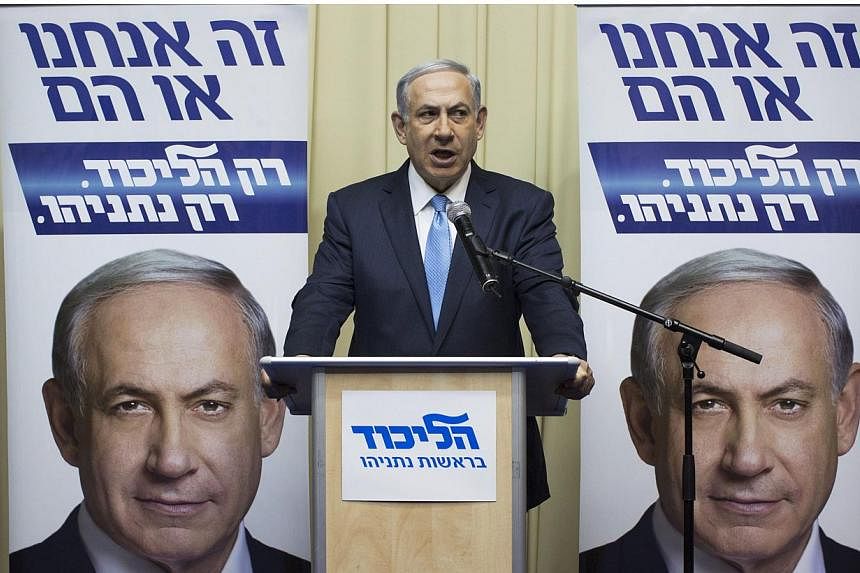TEL AVIV (AFP) - Israeli Prime Minister Benjamin Netanyahu claimed victory in elections on Tuesday as exit polls put him neck-and-neck with centre-left rivals after a late fightback in his bid for a third straight term.
Netanyahu would have a far easier task of putting together a 61-seat majority than Herzog, who said: "I intend to make every effort to build a real social government in Israel."
Analysts said Netanyahu was in a stronger position to forge a coalition with his rightwing allies that would extend his six years in power.
Figures published by public Channel 1 and private Channel 10 television both gave Netanyahu's Likud and Isaac Herzog's Zionist Union 27 seats each in the 120-member parliament.
A third poll by private Channel 2 gave Likud a one-seat lead.
"Against all odds: a great victory for the Likud. A major victory for the people of Israel!" Netanyahu wrote on his official Twitter account.
Netanyahu, 65, enjoyed a surge after a last-minute appeal to his supporters to go to the polls to counter a high turnout among Arab Israelis.
"The rule of the rightwing is in danger. Arab voters are going to the polls in droves!" he said in a video on Facebook. "Go to the polling stations! Vote Likud!" The main Arab parties took third place with 13 seats after joining forces to challenge the premier, according to exit polls.
Netanyahu fell foul of the electoral authorities who blocked the broadcast of his press conference while voting was under way, saying that "propaganda" was banned on election day.
Netanyahu had lagged behind the centre-left Zionist Union in surveys ahead of the vote, which was seen as a referendum on his premiership.
"Netanyahu has done it. He has managed to catch up in the final lap," said Claude Klein, a specialist in constitutional law at Jerusalem's Hebrew University.
"On paper, Isaac Herzog has no chance of putting together a majority which would depend on the support of the Arab List which includes openly anti-Zionist MPs." The outcome of the vote is likely to determine the prospects for new Middle East peace talks and Israel's troubled relations with its US ally.
In a late appeal to the far-right ahead of the polls, Netanyahu ruled out the establishment of a Palestinian state if reelected, effectively reneging on his 2009 endorsement of a two-state solution.
Herzog, 54, has repeatedly called for the creation of a Palestinian state alongside Israel.
'SERIOUS PROBLEMS'
Some 5.8 million people were eligible to vote, with 25 parties vying for the Knesset.
"Israel has serious problems, and only a rightwing leader can handle them," said a Jerusalem voter who gave his name as Yehoshua.
"The only prime minister who can do this is Bibi," he said, using Netanyahu's nickname.
But others took a different view.
"I'd like to see Netanyahu disappear for many, many years. The most important issue is relations with the Palestinians," said Shulamit Laron, as music blasted from a nearby shop whose walls and door were covered with pictures of "Bibi" - the burly Israeli leader.
The Palestinians vowed to step up their diplomatic campaign for statehood following the exit polls.
"It is clear that Prime Minister Benjamin Netanyahu will form the next government, so we say clearly that we will go to the International Criminal Court in the Hague and we will speed up, pursue and intensify" all diplomatic efforts, chief negotiator Saeb Erakat told AFP.
Netanyahu put security at the forefront of his campaign, arguing he is the only one capable of protecting Israel from an Iranian nuclear threat.
COALITION BUILDING
It was Israel's third election since 2009 and the biggest challenge yet for Netanyahu, who is seeking a third consecutive term, and a fourth in total.
Under Israel's electoral system, the prime minister is not the head of the party that gains the most seats but whoever can build a coalition commanding a majority of at least 61 seats in parliament.
In the mixed Jewish-Arab port city of Haifa, around 50 people were lined up outside an Arab school to cast their vote.
"This is the first time that I've seen so many people here to vote," said Ehab Hamam, a 37-year-old Arab Israeli working in hi-tech.
"For the Arabs, voting in this election is saying to the right: We are here," he said.
Ayman Odeh, head of the Arab Joint List, said it was a "historic day" for Israel's Arab minority because it would have a greater influence in parliament.
"I voted for the Arab List because solidarity between Jews and Arabs is important for me," said Karin Michael, a 40-year-old book publisher in Tel Aviv.

